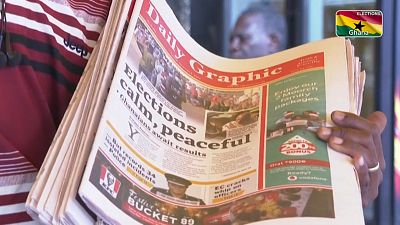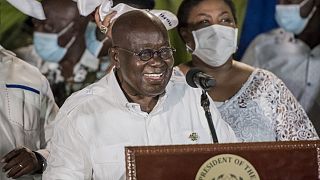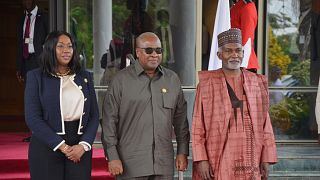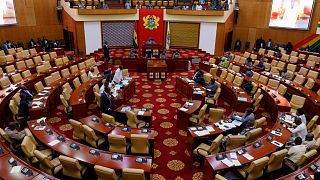Ghana
Five people have been killed in election-linked violence in Ghana, police said on Wednesday in what it described as separate incidents that occurred since the morning of Monday's presidential and parliamentary vote.
The Ghanaian Police Service said it recorded over 60 incidents. "Twenty-one of the incidents are true cases of electoral violence, six of which involve gunshots resulting in the death of five," it said.
President Nana Akufo-Addo ran for re-election against main rival, former President John Mahama, and 10 other candidates.
On Tuesday, opposition leader John Mahama warned President Nana Akufo-Addo against any attempt to steal this week's election, as both sides claimed they were winning ahead of official results of the vote.
The elections have largely been deemed free and fair by observers but the strong statement by John Mahama raised the temperature after Monday's presidential and parliamentary polls in a country known for stability in a troubled region.
"Some of what is happening is unacceptable and Nana Akudo-Addo continues to show credentials that are very undemocratic," Mahama told a hastily convened press conference in the capital Accra Tuesday evening.
"You cannot use the military to try and overturn some of the results in constituencies that we have won. We will resist any attempts to subvert the sovereign will of the Ghanaian people," the 62-year-old former president said.
Information minister Kojo Oppong Nkrumah told a press conference -- convened just minutes after Mahama spoke -- that allegations of intimation by soldiers were false.
The electoral commission has yet to announce the final official results but the race was expected to be close between Mahama and Akufo-Addo, 76, of the centre-right New Patriotic Party (NPP), with recent polls putting the incumbent narrowly ahead.
The presidency released an unofficial tally on Tuesday claiming that results from 91 percent of polling stations showed the president with 52.25 percent of votes and Mahama with 46.44 percent.
Mahama, the leader of the centre-left National Democratic Congress (NDC), meanwhile claimed that his party had won a majority -- 140 -- of the 275 seats in parliament.
"We thank the Ghanaian people for the confidence they've expressed in us. It's clear, the Ghanaian people want change in this country," Mahama said.
The government strongly rejected the opposition's claim that it had won a parliamentary majority, saying the announcement "could endanger the peace of this country."
Oppong Nkrumah said "this dog whistle to supporters by the candidate to jubilate, to get out on the streets" was "categorically irresponsible and it flies in the face of good conduct."
- 'Isolated challenges' -
The electoral commission has urged the public to wait, saying it was "working round the clock to ensure that the collated results are accurate and a true refection of the will of the people".
"The commission will release all the certified results as soon as they are received," it said in a statement on Tuesday afternoon.
At a polling station in Accra's Jamestown neighbourhood, dozens of election staff spent Monday night counting ballots while party officials, journalists and election observers watched, some half asleep.
Outside the gates, guarded by a police tank and a handful of armed guards, some residents of the poor neighbourhood were nervous.
"People are saying NDC won but I voted NPP!" said Rebecca Vorsah, a 20-year-old student among the nation's 17 million registered voters.
Some 12,000 observers deployed on voting day across Ghana gave the process a relatively clean bill of health.
A coalition of observers, CODEO, said its 4,000 observers reported a total of 254 incidents during the voting process.
"While there were some challenges, these challenges were isolated and did not undermine the process's overall credibility," it said in a statement.
- Economic woes ahead -
There has never been a second round in Ghanaian elections and the two main parties have handed over power peacefully seven times since the return of democracy more than 30 years ago.
Post-electoral grievances have always been pursued through the courts.
To ensure its continued tradition of peaceful polls, Akufo-Addo and Mahama signed a symbolic peace pact on Friday.
The stability in Ghana contrasts with that of other countries in the region, with deadly unrest this year in Guinea and Ivory Coast.
Key issues that voters want the next government to address included unemployment, infrastructure, education and health.
The world's second-largest cocoa-producing country has made giant strides in the last 20 years but many people still live in extreme poverty and the country faces mounting debt.
Ghana could face recession in 2021 with double digit inflation, according to Damina Advisors, a political risk consultancy.












01:52
Togo’s security forces cast early votes ahead of high-stakes municipal elections
02:20
Descendants of enslaved Africans find connection in Ghana
Go to video
U.S. slashes visa duration for some African nationals amid policy shift
Go to video
Evacuations begin: African citizens caught in Israel-Iran crossfire
Go to video
Togo suspends French state-owned broadcasters RFI and France 24
Go to video
Protesters gather in Ivory Coast, demand Thiam's return on electoral list